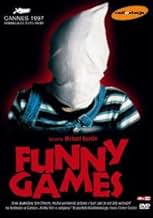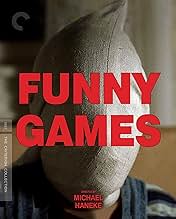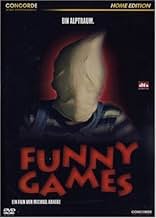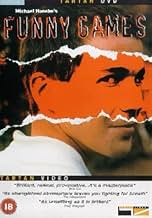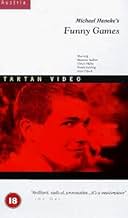Two violent young men take a mother, father, and son hostage in their vacation cabin and force them to play sadistic "games" with one another for their own amusement.Two violent young men take a mother, father, and son hostage in their vacation cabin and force them to play sadistic "games" with one another for their own amusement.Two violent young men take a mother, father, and son hostage in their vacation cabin and force them to play sadistic "games" with one another for their own amusement.
- Awards
- 5 wins & 9 nominations total
- Director
- Writer
- All cast & crew
- Production, box office & more at IMDbPro
Featured reviews
First things first, Michael Haneke HATES Quentin Tarantino's films. He hates the way violence and death are shown as being 'cool' - Cool gangsters executing their enemies whilst saying cool lines (And you will know, that my name is the Lord! etc,etc)with a cool song playing in the background. This is not how violence is in the real world, violence is a horrible fact of life, not a glamourous thing for youths to copy, and I think Haneke intended Funny Games to show it how it really is. I watched Funny Games without the slightest clue what the film was about, so I just had to sit back and take it as it comes. At first, I wasn't too impressed. I thought the scenes were too long and dragged out, yet at the same time, I felt a strange feeling of suspense. The incredibly long camera shots leave you that bored, that you think "Something bad is going to happen soon, I can tell...". The suspense also lasts right through the film 'til the very end. You don't want to watch it, but at the same time, you feel hypnotised by it.
I will not detail any events of the film, to save spoiling the atmosphere, but I will note one thing that people tend to be confused about:- "Why did the family let them into the house in the first place?" The two characters of Peter and Paul are let to walk all over the family because of one flaw in the bourgios psyche - 'The more polite a person is, the better a person they are.' This absurd way of thinking is played on by Peter and Paul and they obviously score, plus 'getting into the house without breaking in' is also one of their 'games'.For those who haven't seen the film, I definitely wouldn't recommend this for a night in with the parents/girlfriend, but I definitely would for people who want to see the difference between death and Tarantino-glam. Prepare for a highly suspenseful yet sickeningly violent, non-Hollywood, edge-of-the-seat piece of art. 8/10
I will not detail any events of the film, to save spoiling the atmosphere, but I will note one thing that people tend to be confused about:- "Why did the family let them into the house in the first place?" The two characters of Peter and Paul are let to walk all over the family because of one flaw in the bourgios psyche - 'The more polite a person is, the better a person they are.' This absurd way of thinking is played on by Peter and Paul and they obviously score, plus 'getting into the house without breaking in' is also one of their 'games'.For those who haven't seen the film, I definitely wouldn't recommend this for a night in with the parents/girlfriend, but I definitely would for people who want to see the difference between death and Tarantino-glam. Prepare for a highly suspenseful yet sickeningly violent, non-Hollywood, edge-of-the-seat piece of art. 8/10
10Flador
SPOILER: Okay... I just read most of the 144 user reviews.... Basically I wanted to make up my mind about this film, a film that is a very heavy load.
I've seen this movie 5 years ago, the good thing is most of the time you forget about (having seen) it but now and then you recall it. I can understand that many people hate this film, it is not nice to watch, the more when you see it in a theatre where the only chance to break its spell is leaving the theatre. Regardless if you leave or stay and watch it leave it beats you one way or the other. I fully agree with many other reviewers that I have no idea whom I should recommend it too. I am tempted to watch it a second time but didn't make it happen in 5 years.
Don't get me wrong. I think it is an excellent movie. It is also very disturbing and upsetting, I can't think of the right mood to watch it cause it'll take you down. And I think here is where the movie polarises. If, after watching, you find yourself deducting some message in the violence, and perhaps rethink violence - in both real life and movies - you will, well, also will have found some reason for this movies existence, if not - and it might be better if one does not - you will join in the 'crappiest movie ever chorus'.
I do however want to point out some achievement of this production:
*) The movie catches the audience in theatre. *) It does shock the audience but most of the violence is off-screen. You see more people dying in many fast-driven action movies. Only here you care. There is minor suspense, but I, personally, wouldn't put it into that category. (But then I am no horror/shocker/suspense fan and can easily err here) *) It's hard to compare it with any other movie (that I have seen). I am not sure if this is an achievement, but it's outstanding.
The reason I think Haneke made this movie. or, what I deducted from it is how far away violence and death are in our everyday lives today. While Hollywood - and other film productions serve them daily right in our living room, we hardly notice them anymore. Violence also sells movies, and we're meanwhile pretty used to that. Haneke also serves violence, and he dishes it next-door. He turns into a moral figure that asks the audience if they want more (after all me and you consume it every day) - and while HERE we want to say 'no please stop' he doesn't do our silent bidding. He pushes us down the drain, forcing us to deal with aspects of the violence we don't (want to) see. He even goes one step further. He offers us a 'good' ending, a payback that would make it easier for us to bear the movie, only to snatch it back and rip us of any cheerful emotion, telling us like 'no, sorry, here it doesn't work that way'.
I also read reviews mentioning the unsatisfying (often used, cliche) end. One more time Haneke manages to disappoint us, so far we were driven and didn't know what would happen, what to expect.
Only in the ending, we see it coming, and so it ends, obviously similar to many other movies. We're back standard movie stuff, the arc bent and the connection made.
"Funny games" is everything else but the title. Perhaps it refers to the funny games built on standard film violence in everyday movies. Perhaps it doesn't. Perhaps Haneke wants to stress that violence is a bad thing. Perhaps he's just sick.
One thing for sure, regardless if you like it, don't care, or hate it. You might have seen something somewhat like it, but nothing similar.
If you hate shockers, don't watch it. It will only be torture. If you love suspense, sorry, only very little gore here.
If you plan to watch it, calculate a few hours before you will manage to put your head to rest.
And don't watch it it personal crisis.
This movie will make you feel bad. If you watch it in a cinema, just look around. You're not alone with this feeling.
I've seen this movie 5 years ago, the good thing is most of the time you forget about (having seen) it but now and then you recall it. I can understand that many people hate this film, it is not nice to watch, the more when you see it in a theatre where the only chance to break its spell is leaving the theatre. Regardless if you leave or stay and watch it leave it beats you one way or the other. I fully agree with many other reviewers that I have no idea whom I should recommend it too. I am tempted to watch it a second time but didn't make it happen in 5 years.
Don't get me wrong. I think it is an excellent movie. It is also very disturbing and upsetting, I can't think of the right mood to watch it cause it'll take you down. And I think here is where the movie polarises. If, after watching, you find yourself deducting some message in the violence, and perhaps rethink violence - in both real life and movies - you will, well, also will have found some reason for this movies existence, if not - and it might be better if one does not - you will join in the 'crappiest movie ever chorus'.
I do however want to point out some achievement of this production:
*) The movie catches the audience in theatre. *) It does shock the audience but most of the violence is off-screen. You see more people dying in many fast-driven action movies. Only here you care. There is minor suspense, but I, personally, wouldn't put it into that category. (But then I am no horror/shocker/suspense fan and can easily err here) *) It's hard to compare it with any other movie (that I have seen). I am not sure if this is an achievement, but it's outstanding.
The reason I think Haneke made this movie. or, what I deducted from it is how far away violence and death are in our everyday lives today. While Hollywood - and other film productions serve them daily right in our living room, we hardly notice them anymore. Violence also sells movies, and we're meanwhile pretty used to that. Haneke also serves violence, and he dishes it next-door. He turns into a moral figure that asks the audience if they want more (after all me and you consume it every day) - and while HERE we want to say 'no please stop' he doesn't do our silent bidding. He pushes us down the drain, forcing us to deal with aspects of the violence we don't (want to) see. He even goes one step further. He offers us a 'good' ending, a payback that would make it easier for us to bear the movie, only to snatch it back and rip us of any cheerful emotion, telling us like 'no, sorry, here it doesn't work that way'.
I also read reviews mentioning the unsatisfying (often used, cliche) end. One more time Haneke manages to disappoint us, so far we were driven and didn't know what would happen, what to expect.
Only in the ending, we see it coming, and so it ends, obviously similar to many other movies. We're back standard movie stuff, the arc bent and the connection made.
"Funny games" is everything else but the title. Perhaps it refers to the funny games built on standard film violence in everyday movies. Perhaps it doesn't. Perhaps Haneke wants to stress that violence is a bad thing. Perhaps he's just sick.
One thing for sure, regardless if you like it, don't care, or hate it. You might have seen something somewhat like it, but nothing similar.
If you hate shockers, don't watch it. It will only be torture. If you love suspense, sorry, only very little gore here.
If you plan to watch it, calculate a few hours before you will manage to put your head to rest.
And don't watch it it personal crisis.
This movie will make you feel bad. If you watch it in a cinema, just look around. You're not alone with this feeling.
A pair of polite, bland-ish German teenagers encounter a woman, her husband and son in a remote lakeside cottage, then spend the night terrorizing them with "funny games." The set-up is identical to that of Elia Kazan's THE VISITORS, both versions of DESPERATE HOURS, and many other claustrophobic thrillers; but the feeling of the picture is that of a hundred-minute-long extended dance remix of the ear-slicing in RESERVOIR DOGS. The writer-director Michael Haneke has one ace up his sleeve: the handsomer of the two sociopaths is given asides to the camera, on the order of, "You are on their side, aren't you?"
The point of all this, apparently, is that the audience is implicated in the action, because we, as pop-culture consumers, consume torture and protracted murder as entertainment. But there's a flaw in Haneke's logic: the only time we consume torture and protracted murder as entertainment is in recondite European art films like I STAND ALONE, MAN BITES DOG, and FUNNY GAMES.
This is the kind of picture that gets bluenose types all huffy, and prone to pronouncements on the order of, "This is the most repellent movie ever made!" I'll stay off that high horse--but I will say, a few hours after seeing the picture, that there is something singularly loathsome in the hypocrisy of Haneke's coating a suspenseless piece of fictional snuff porn in the sanctimony of its being a Statement on Violence and Media. Haneke makes the victims as dull and uncharacterized as the victors; removes just about any plausible means of escape or table-turning; and subtracts any reason for us to care about the outcome, except our desire not to witness hideous suffering. What's left--an orgy of S&M-like abuse--certainly does make the audience squirm. But so what? So would a videotape of anonymous torture, or the capture and abuse of an animal. FUNNY GAMES doesn't exist on a political or philosophical level (like I STAND ALONE); its attempts at mordant humor are collegiate (unlike MAN BITES DOG); it certainly doesn't hold up a mirror to a junk-food culture (like NATURAL BORN KILLERS). It's a wallow. And you know what side the filmmakers are on when one of the sadists terrifies a little kid by slipping on a CD in a neighbor's house the kid has escaped to, and the music is that well-known favorite of middle-aged bourgeois people on vacation...John Zorn and the Naked City.
This kind of Extreme Cinema has worked much better when practiced by artists in totally disreputable sub-pulp forms--like Lucio Fulci and Ruggero Deodato, whose sometimes almost unwatchable films engage in a spiritual wrestling match between the desire to go to the limits, and the conscience that watches over the mayhem. I was shocked to discover that Haneke is nearly sixty--this picture has the sensibility of a kid turned on by the autopsy pictures at Amok Books. As he sticks bamboo under our fingernails, your mind is so unoccupied it asks other questions. Like: Why would any sane family entertain for a minute two young strangers wearing fingerprint-proof gloves in the middle of summer? And: Is the actress playing the mother this terrible because no one else would take such a degrading role?
The point of all this, apparently, is that the audience is implicated in the action, because we, as pop-culture consumers, consume torture and protracted murder as entertainment. But there's a flaw in Haneke's logic: the only time we consume torture and protracted murder as entertainment is in recondite European art films like I STAND ALONE, MAN BITES DOG, and FUNNY GAMES.
This is the kind of picture that gets bluenose types all huffy, and prone to pronouncements on the order of, "This is the most repellent movie ever made!" I'll stay off that high horse--but I will say, a few hours after seeing the picture, that there is something singularly loathsome in the hypocrisy of Haneke's coating a suspenseless piece of fictional snuff porn in the sanctimony of its being a Statement on Violence and Media. Haneke makes the victims as dull and uncharacterized as the victors; removes just about any plausible means of escape or table-turning; and subtracts any reason for us to care about the outcome, except our desire not to witness hideous suffering. What's left--an orgy of S&M-like abuse--certainly does make the audience squirm. But so what? So would a videotape of anonymous torture, or the capture and abuse of an animal. FUNNY GAMES doesn't exist on a political or philosophical level (like I STAND ALONE); its attempts at mordant humor are collegiate (unlike MAN BITES DOG); it certainly doesn't hold up a mirror to a junk-food culture (like NATURAL BORN KILLERS). It's a wallow. And you know what side the filmmakers are on when one of the sadists terrifies a little kid by slipping on a CD in a neighbor's house the kid has escaped to, and the music is that well-known favorite of middle-aged bourgeois people on vacation...John Zorn and the Naked City.
This kind of Extreme Cinema has worked much better when practiced by artists in totally disreputable sub-pulp forms--like Lucio Fulci and Ruggero Deodato, whose sometimes almost unwatchable films engage in a spiritual wrestling match between the desire to go to the limits, and the conscience that watches over the mayhem. I was shocked to discover that Haneke is nearly sixty--this picture has the sensibility of a kid turned on by the autopsy pictures at Amok Books. As he sticks bamboo under our fingernails, your mind is so unoccupied it asks other questions. Like: Why would any sane family entertain for a minute two young strangers wearing fingerprint-proof gloves in the middle of summer? And: Is the actress playing the mother this terrible because no one else would take such a degrading role?
I saw this movie again last night, for the third time, and once again had to keep watching each torturous minute until its chilling end. Going through the comments index, I see the expected responses: it was boring: it was pointless: it was too long: it's a satire: the games aren't actually that funny: it involved the audience in a neato way: it's nothing new: it's been done before. So I here offer an interpretation to add to the cacophany of reactions that FUNNY GAMES seem to engender.
What this movie reminds me of is the Book of Job, in the Bible, where God and Satan decide for their own amusement to torture this guy Job, killing his family, racking him with boils, and various other divine amusements. While watching this movie last night, I thought of another reference, this time from "King Lear": "Like flies to wanton schoolboys are we to the gods;/ They kill us for their sport." What this movie does is challenge the audience's own involvement in visual narrative -- usually, we watch movies from somewhere on-high and omniscient; we're invisible but we see all; we're voyeurs, just like God. In Haneke's film, we identify not with the victims but with the all-powerful killers as they set about their funny games. The two polite young men are performing their entertainments for us, the viewers; they're slaking our bloodthirst, our desire for gory spectacle - - after all, isn't this why we watch movies like this in the first place? Haneke, however, doesn't play the usual evasions; he makes explicit the audience's participation in violence; and he forces upon us the need to take responsibility for it.
I find this fascinating. I also find the negative comments here fascinating as well -- "not violent enough!" "the victims deserve to die..." "all the violence is off-screen..." "no gore at all, 'LAST HOUSE ON THE LEFT' did it first, with more blood...." etc. as being inadvertantly revealing of those viewers' psyche. I especially love the comment made by that one Viking guy, who writes that Haneke's film has "no point," and goes on to say "...I just hope those people break into MY house, so I can break them in two!"
I think Haneke made his point.
What this movie reminds me of is the Book of Job, in the Bible, where God and Satan decide for their own amusement to torture this guy Job, killing his family, racking him with boils, and various other divine amusements. While watching this movie last night, I thought of another reference, this time from "King Lear": "Like flies to wanton schoolboys are we to the gods;/ They kill us for their sport." What this movie does is challenge the audience's own involvement in visual narrative -- usually, we watch movies from somewhere on-high and omniscient; we're invisible but we see all; we're voyeurs, just like God. In Haneke's film, we identify not with the victims but with the all-powerful killers as they set about their funny games. The two polite young men are performing their entertainments for us, the viewers; they're slaking our bloodthirst, our desire for gory spectacle - - after all, isn't this why we watch movies like this in the first place? Haneke, however, doesn't play the usual evasions; he makes explicit the audience's participation in violence; and he forces upon us the need to take responsibility for it.
I find this fascinating. I also find the negative comments here fascinating as well -- "not violent enough!" "the victims deserve to die..." "all the violence is off-screen..." "no gore at all, 'LAST HOUSE ON THE LEFT' did it first, with more blood...." etc. as being inadvertantly revealing of those viewers' psyche. I especially love the comment made by that one Viking guy, who writes that Haneke's film has "no point," and goes on to say "...I just hope those people break into MY house, so I can break them in two!"
I think Haneke made his point.
In this cross between Who's Afraid Of Virginia Woolf and A Clockwork Orange, two insolent young psychopaths torment a vacationing family.
It was hard to organize my thoughts on this movie, never mind rating it. As a thriller, this is a tense, well-acted, and relentless experience, marred only by a contrived sequence two-thirds through in which characters behave in unbelievably stupid fashion. However, said sequence is preceded by an incredibly effective ten-minute take. Unusually lengthy takes are often deemed self-indulgent, but this one is anything but.
As an ideological statement, though, this film is a failure. And there is no doubt that writer-director Michael Haneke is trying to make a statement. By having one of the psychos address the camera a few times, saying things to the effect that they have to give the viewers their money's worth, Haneke is essentially wagging his finger at anyone who has ever enjoyed the portrayal of violence in a film. This theme is certainly open to debate, but the problem is that Haneke expresses it in such a condescending way. His harrowing treatment of violence already serves as an excellent counterpoint to other films that glamorize it. There was no need to then leave viewers feeling as though they'd just been lectured by a stern parent.
The last time a filmmaker made me angry, it was when I saw Independence Day, and it was for the same reason. In both cases, the writer and the director display contempt by assuming their audiences are idiots. My anger didn't really ignite, though, until I watched a short interview with Haneke on the DVD. It made me never want to see another one of his films. The man is disgustingly full of himself.
So why the relatively high rating? Because as pretentious and self-important as Haneke is, he is also very talented. The movie is very effective on an emotional level, and it's possible to watch it while ignoring the director's wrong-headed decisions.
It was hard to organize my thoughts on this movie, never mind rating it. As a thriller, this is a tense, well-acted, and relentless experience, marred only by a contrived sequence two-thirds through in which characters behave in unbelievably stupid fashion. However, said sequence is preceded by an incredibly effective ten-minute take. Unusually lengthy takes are often deemed self-indulgent, but this one is anything but.
As an ideological statement, though, this film is a failure. And there is no doubt that writer-director Michael Haneke is trying to make a statement. By having one of the psychos address the camera a few times, saying things to the effect that they have to give the viewers their money's worth, Haneke is essentially wagging his finger at anyone who has ever enjoyed the portrayal of violence in a film. This theme is certainly open to debate, but the problem is that Haneke expresses it in such a condescending way. His harrowing treatment of violence already serves as an excellent counterpoint to other films that glamorize it. There was no need to then leave viewers feeling as though they'd just been lectured by a stern parent.
The last time a filmmaker made me angry, it was when I saw Independence Day, and it was for the same reason. In both cases, the writer and the director display contempt by assuming their audiences are idiots. My anger didn't really ignite, though, until I watched a short interview with Haneke on the DVD. It made me never want to see another one of his films. The man is disgustingly full of himself.
So why the relatively high rating? Because as pretentious and self-important as Haneke is, he is also very talented. The movie is very effective on an emotional level, and it's possible to watch it while ignoring the director's wrong-headed decisions.
Did you know
- TriviaUlrich Mühe and Susanne Lothar, who play the father and mother, were a couple in real life from this movie until Mühe's death in 2007.
- GoofsWhen Anna and Georg are driving in their car, the reflection of a microphone between the front seats can be seen on the window.
- Crazy creditsThe front credits list "music by" several classical composers and John Zorn. Given the director's outspoken views on modern media, including the "composer" of the hardcore "thrash metal" songs alongside the likes of Handel and Mozart is part of his message.
- ConnectionsFeatured in The Last Days of the Board (1999)
- SoundtracksCara Salva
from 'Atalanta'
Music by George Frideric Handel (as G.F. Händel)
Sung by Beniamino Gigli
Published by EMI DA 1918
Details
- Release date
- Country of origin
- Official site
- Languages
- Also known as
- Juegos divertidos
- Filming locations
- Production companies
- See more company credits at IMDbPro
Box office
- Gross worldwide
- $2,014
- Runtime
- 1h 48m(108 min)
- Color
- Sound mix
- Aspect ratio
- 1.85 : 1
Contribute to this page
Suggest an edit or add missing content

